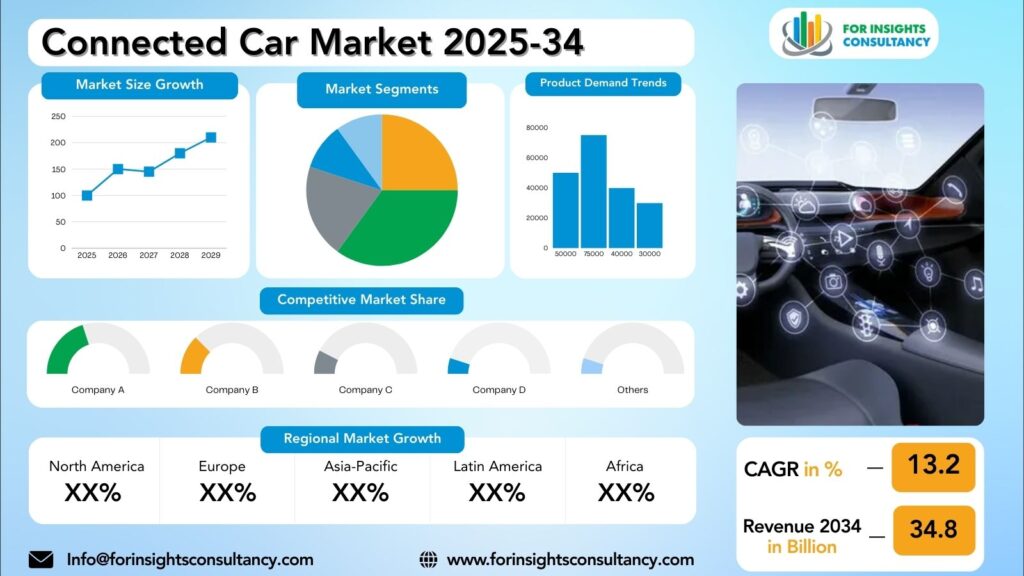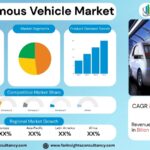
Connected Car Market Research Report by Technology/Connectivity Solution (Embedded, Tethered, Integrated), by Service/Application (Driver Assistance, Infotainment, Telematics, Safety and Security, Vehicle Management, Mobility Management, Over-the-Air (OTA) Updates), by Communication Type, by Sales Channel, and by Region Global Market Analysis and Forecast, 2025-2034
Sep-2025 Formats | PDF | Category: Automotive | Delivery: 24 to 72 Hours
Connected Car Market is forecast to increase from USD 13.6 Billion in 2025 to USD 34.8 Billion by 2034, at a CAGR of 13.2%.
Connected Car Market: A Comprehensive Overview and Future Developments
A connected car is a vehicle equipped with internet connectivity and wireless technology, allowing it to communicate with other devices both inside and outside the vehicle. Its sensors and processors collect and analyze data, providing real-time information to drivers.
Major players in the connected car market, including automotive manufacturers, technology companies, and telecommunications providers, are leading the way in developing cutting-edge technologies. Tesla, BMW, Ford, Google, and AT&T are investing heavily in research and development to bring new features and capabilities to connected cars.
The future of connected cars looks promising, with 5G technology integrating for faster and more reliable connectivity, real-time traffic updates, enhanced navigation systems, and seamless communication between vehicles. Additionally, autonomous driving capabilities will pave the way for fully self-driving cars.
Connected Car Market Dynamics
Growth Drivers
The rise of IoT in automotive technology has transformed vehicles into smart, interconnected devices, enabling seamless communication between vehicles, infrastructure, and personal devices. This interconnected network offers innovative features and services, such as real-time traffic updates, remote diagnostics, predictive maintenance, and autonomous driving capabilities. Key growth drivers include advanced safety features, such as lane departure warnings, automatic emergency braking, and adaptive cruise control, which reduce collision risks and improve road safety.
Connected cars also offer enhanced user experiences, such as voice-activated controls, personalized entertainment options, and seamless integration with smart home devices. These features provide a comfortable and enjoyable driving experience, making long journeys more enjoyable and stress-free.
Connected cars are also driving the shift towards more sustainable and efficient transportation, optimizing routes, reducing idling time, and monitoring vehicle performance in real time. They can also facilitate the adoption of electric vehicles by providing real-time charging station locations and battery monitoring capabilities.
Data monetization opportunities are also present in the automotive ecosystem, with the vast amounts of data generated by connected cars offering significant monetization opportunities for automakers and third-party service providers. By harnessing this data effectively, stakeholders in the automotive ecosystem can unlock new revenue streams and create value for consumers and businesses.
Restraints
The connected car market faces several challenges, including data security concerns, infrastructure limitations, regulatory challenges, and consumer acceptance. Data security is a major concern as cars are equipped with sensors, cameras, and other connected devices, increasing the risk of cyber attacks. Manufacturers and developers must prioritize cybersecurity to protect sensitive data and maintain customer privacy. Infrastructure limitations are another challenge, as many regions lack the necessary infrastructure to support connected cars, impacting their performance and reliability. Investments in infrastructure improvements and 5G networks are essential to overcome this restraint.
Regulatory challenges are another significant challenge in the connected car market. Different countries and regions impose varying regulations on data privacy, cybersecurity, and autonomous driving, creating barriers to market entry and complicating the development and deployment of connected car technology. Consumer acceptance remains a significant restraint, with younger generations being more open to adopting new technologies, while older demographics may be hesitant due to concerns about data privacy, security, and the complexity of the technology. Manufacturers must focus on educating consumers about the benefits and safety measures of connected cars to increase acceptance and drive adoption rates.
Opportunities
The connected car market offers numerous opportunities for businesses, including enhanced safety features, improved convenience, entertainment options, data analytics, and monetization. Connected cars can be equipped with sensors and cameras that provide real-time information about road conditions, traffic patterns, and potential hazards, enabling drivers to avoid accidents and navigate more efficiently. They can also offer voice command technology, maintenance alerts, and automatic service appointment scheduling, saving drivers time and hassle.
Connected cars also serve as hubs for entertainment, allowing passengers to stream music, movies, and podcasts during long drives, as well as interactive screens and gaming consoles. Data analytics from connected cars can help businesses tailor their products and services to better meet consumer needs, improve traffic management, and improve urban planning.
Monetization through subscription services, in-car advertisements, and e-commerce options can also open up new revenue streams and business models for the automotive industry. Additionally, connected cars can contribute to environmental sustainability by optimizing routes, reducing idling time, and promoting eco-friendly driving habits, reducing fuel consumption and greenhouse gas emissions.
Challenges
The increasing connectivity of vehicles has raised cybersecurity concerns, as hackers could potentially gain access to a vehicle’s systems, posing dangerous situations. Manufacturers must invest in robust cybersecurity measures to ensure the safety and security of connected cars. Data privacy issues arise from the vast amount of data collected by connected cars, including location, driving behavior, and personal information. Manufacturers must be transparent about data collection and usage to build trust with consumers.
Interoperability challenges arise as more automakers introduce connected car features, necessitating standardization for seamless communication between vehicles and infrastructure. Infrastructure limitations, such as high-speed networks and reliable communication systems, may hinder the adoption of connected car technology in some regions. The regulatory landscape for connected cars is evolving, with varying regulations regarding data privacy, cybersecurity, and communication standards across regions. Clear and consistent regulations are needed to enable widespread adoption of connected car technology.
Connected Car Market Top Companies Covered In This Report:
Evaluate The Strategic Positioning And Innovation Pipelines Of Leading Market Companies-From Multinational Enterprises To Disruptive Regional Firms. Understand How Key Players Are Innovating, Expanding, And Capturing Value, And Use Competitive Benchmarks To Plan Your Next Move.
- Continental AG (Germany)
- Robert Bosch GmbH (Germany)
- Harman International (US)
- Visteon (US)
- Airbiquity Inc. (US)
- Cloudmade (UK)
- Intellias (Ukraine)
- Tesla (US)
- Ford Motors (US)
- Audi (Germany)
- AT&T (US)
- Qualcomm Technologies Inc. (US)
- Verizon (US)
- TomTom International BV. (Netherlands)
- Sierra Wireless (Canada)
- APTIV (Ireland)
- SPA (Italy)
- Panasonic (South Korea)
- Microsoft Azure (US)
- Telefonica (Spain)
Connected Car Market News
Harman (Samsung)
In June 2025, Harman debuted the world’s first in-vehicle display powered by Samsung Neo QLED in the new Tata Motors Harrier.ev, showcasing how Samsung’s consumer electronics expertise is being leveraged for automotive applications.
Aptiv
Aptiv reported a 3.1% rise in net sales in the first half of 2025, and continued to invest in key regions. In August 2025, the company inaugurated a new technical center in Chennai, India, to focus on developing software-defined vehicle solutions for the local market.
Continental
At CES 2025, Continental unveiled its “Intelligent Vehicle Experience Car,” which uses biometric recognition to provide touchless entry and personalized experiences. The car’s technology anticipates user intentions and integrates seamlessly with various in-cabin functions.
Qualcomm and NVIDIA
In January 2025, Qualcomm and Panasonic Automotive Systems announced an expanded collaboration to utilize the latest Snapdragon® Cockpit Elite platform. This new partnership aims to bring advanced intelligence, including on-device generative AI, to vehicle cockpits and infotainment systems.
NVIDIA’s news focused on the ongoing advancement of its DRIVE platform. At CES and GTC 2025, the company showcased its new tools for AV simulation and development, including the Omniverse and Cosmos platforms. This is part of NVIDIA’s strategy to provide a comprehensive, end-to-end solution for the autonomous and connected vehicle ecosystem.
Segmented View of the Industry:
The Connected Car Market Is Mapped Through A Multidimensional Lens-Tracking Shifts Across Product Type, Applications, And Geographic Regions. This Segmented Approach Enables Businesses To Localize Their Growth Plans And Align Offerings With The Most Profitable Demand Centers.
Segmentation by Technology/Connectivity Solution
- Embedded
- Tethered
- Integrated
Segmentation by Service/Application
- Driver Assistance
- Infotainment
- Telematics
- Safety and Security
- Vehicle Management
- Mobility Management
- Over-the-Air (OTA) Updates
Segmentation by Communication Type
- Vehicle-to-Vehicle (V2V)
- Vehicle-to-Infrastructure (V2I)
- Vehicle-to-Cloud (V2C)
- Vehicle-to-Grid (V2G)
Segmentation by Network
- 4G/LTE
- 5G
- 3G
Segmentation by Sales Channel
- Original Equipment Manufacturer (OEM)
- Aftermarket
Global Geographic Coverage:
The Report Provides In-Depth Qualitative and Quantitative Data On the Connected Car Market For All Of The Regions And Countries Listed Below:
North America
North America is at the forefront of the connected car revolution, driven by tech-savvy consumers seeking services like real-time traffic updates, remote vehicle diagnostics, and in-car entertainment systems. Major cities like New York and Los Angeles have seen a surge in demand for these services, making their daily commutes more efficient.
Canada is also experiencing growth in the connected car market, with consumers seeking features that enhance their driving experience, such as in-car Wi-Fi, voice-activated controls, and GPS navigation systems. Automakers in Canada are incorporating more connected car features into their vehicles to meet this demand.
Mexico is also experiencing growth in the connected car market, with more accessible technology attracting drivers seeking features that improve their safety on the road, such as collision warning systems, emergency assistance services, and vehicle tracking capabilities.
In conclusion, North America is a key region in the connected car market, with countries like the United States, Canada, and Mexico driving the growth of connected car services. As technology continues to evolve, innovative connected car solutions are expected to transform the way we interact with vehicles.
Europe
The connected car market in Europe is experiencing rapid growth due to technological advancements and increasing demand for convenience and safety features in vehicles. Germany, known for its strong automotive industry, is leading the way with major automakers like BMW, Mercedes-Benz, and Volkswagen investing heavily in connected car technologies. France, with its focus on sustainability and reducing carbon emissions, is also leading the way with major automakers like Renault and Peugeot developing smart and connected car technologies.
The United Kingdom, with its highly developed automotive industry and tech-savvy consumer base, is a prime market for connected cars. Major car manufacturers like Jaguar Land Rover and Aston Martin are incorporating cutting-edge technology into their vehicles to meet this demand. Italy, known for its luxury sports cars, is also making a name for itself in the connected car market, with companies like Ferrari and Lamborghini exploring new ways to connect cars to the digital world.
Spain, with a growing emphasis on smart mobility solutions and sustainable transportation, is seeing an increase in the adoption of connected vehicles. Local car manufacturers like SEAT are investing in connected car technologies to cater to the changing needs of Spanish consumers.
Asia Pacific
China is a leading player in the connected car market due to its booming automotive industry and tech-savvy population. With a large number of internet users and smartphone penetration, Chinese consumers are increasingly adopting connected car technologies like GPS navigation, remote vehicle monitoring, and in-car entertainment systems. Major automakers and tech giants in China are partnering to develop cutting-edge solutions and services for connected vehicles. The government’s support for electric vehicles and smart transportation initiatives further boosts the growth of the connected car market in China.
Japan has been at the forefront of automotive technology innovation for decades, and its automakers are known for their quality, reliability, and commitment to safety. They are home to several companies leading the way in connected vehicle technologies, such as telematics, ADAS, and V2X communication. Collaborations between automakers, telecom companies, and government agencies drive the continuous evolution of connected car solutions in Japan.
South Korea is a key player in the global connected car market, with its advanced infrastructure and tech-savvy population driving adoption of connected vehicle technologies. Korean automakers offer a wide range of features, such as infotainment systems, connectivity services, and remote diagnostics. The government’s focus on smart mobility solutions and digital innovation further propels the growth of the connected car market in South Korea.
Middle East and Africa
The connected car market in Saudi Arabia, UAE, South Africa, and Nigeria is experiencing significant growth due to government initiatives promoting smart transportation solutions and the adoption of advanced technologies like IoT and AI. Leading automotive manufacturers are investing in tailored solutions for local market needs. The UAE is a key market for connected cars, with a focus on smart city initiatives and sustainable transportation. The demand for connected car services such as navigation, remote diagnostics, and entertainment systems is on the rise, as consumers become more aware of the benefits of connected vehicles.
South Africa is also experiencing a shift towards connected services, such as real-time traffic updates, predictive maintenance, and remote vehicle monitoring. Leading automotive manufacturers are offering advanced connected car solutions to cater to evolving consumer needs. Nigeria is emerging as a promising market for connected cars due to its tech-savvy population and increasing smartphone penetration. The market is characterized by the adoption of connected vehicle technologies such as telematics, infotainment systems, and safety features, with automotive companies developing innovative solutions tailored to local market requirements.
In conclusion, the connected car market in the Middle East and Africa region is poised for significant growth due to technological advancements, evolving consumer preferences, and government initiatives promoting smart transportation solutions.
Reasons to Buy:
- The Research Would Help Top Administration/Policymakers/Professionals/Product Advancements/Sales Managers And Stakeholders In This Market In The Following Ways.
- The Report Provides Connected Car Market Revenues At The Worldwide, Regional, And Country Levels With A Complete Analysis To 2034 Permitting Companies To Analyze Their Market Share And Analyze Projections, And Find New Markets To Aim For.
- To Understand The Most Affecting Driving And Restraining Forces In The Market And Their Impact On The Global Market.
- Major Changes And Assessment In Market Dynamics And Developments.
- The Objective Of The Connected Car Market Report Is To Identify New Business Opportunities Using Quantitative Market Forecasts.
- Formulate Sales And Marketing Strategies By Gaining An Understanding Of Competitors, Their Positioning, And Strengths & Weaknesses.
Faq – What Global Leaders Are Asking
What Is The Growth Prospect For The Connected Car Market By 2034?
Connected Car Market Is Expected To Achieve A Stable Growth Rate With A Compound Annual Growth Rate (Cagr) Of About 13.2% From 2025 Through 2034.
What Is Driving The Growth Of The Connected Car Market?
The growth of the connected car market is primarily driven by the rising consumer demand for a seamless, smartphone-like experience and advanced safety features. This is further fueled by the rapid expansion of high-speed networks like 5G and the increasing adoption of over-the-air (OTA) updates and autonomous driving technologies.
Who Are The Key Players In The Connected Car Market, And What Are Their Market Shares?
The Connected Car Market Includes Major Companies Like Continental AG (Germany), Robert Bosch GmbH (Germany), Harman International (US), Visteon (US), Airbiquity Inc. (US), Cloudmade (UK), Intellias (Ukraine), Tesla (US), Ford Motors (US), Audi (Germany), AT&T (US), Qualcomm Technologies Inc. (US), Verizon (US), TomTom International BV. (Netherlands), Sierra Wireless (Canada), APTIV (Ireland), SPA (Italy), Panasonic (South Korea), Microsoft Azure (US), Telefonica (Spain), Others.
Specific Market Share Data Is Not Publicly Available and Is Typically Provided In Detailed, Proprietary Market Research Reports.
Which Regions Are Leading the Connected Car Market Growth?
The Asia-Pacific region is the clear leader in the connected car market, driven by its massive vehicle production and rapid adoption of 5G infrastructure, particularly in China and Japan. North America holds a significant market share, fueled by strong consumer demand for infotainment, advanced safety features, and a growing emphasis on vehicle-to-everything (V2X) communication.
Customization: We Can Provide Following Things
1) On Market More Company Profiles (Competitors)
2) Data About Particular Country Or Region
3) We Will Incorporate The Same With No Additional Cost (Post Conducting Feasibility).
Any Requirement Contact Us: Https://Www.Forinsightsconsultancy.Com/Contact-Us/
Table of Contents
For TOC Contact us: https://forinsightsconsultancy.com/contact-us/






